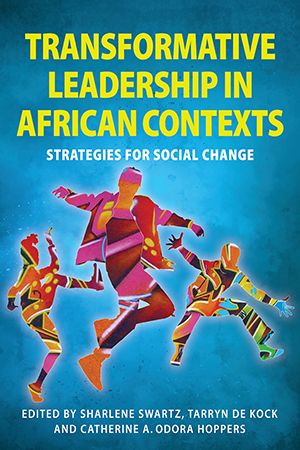
- 2024/462 pages
- Distrubuted for HSRC Press
Transformative Leadership in African Contexts:
Strategies for Social Change
Sharlene Swartz, Tarryn De Kock, and Catherine A. Odora Hoppers, editors
Paperback: $45.00
ISBN: 978-0-7969-2661-6
Ebook: $45.00
ISBN: 978-0-7969-2677-7
Desmond Tutu once said, "There comes a point where we need to stop just pulling people out of the river and find out why they are falling in." The authors of this innovative collection take these words to heart. Embracing a transformative leadership approach, they show how contemporary African leaders are meeting a broad range of challenges as they seek positive change in societies dealing with postcolonial ills and aspirations.
Sharlene Swartz is executive director of the Education and Skills Development Programme at the Human Sciences Research Council. Tarryn De Kock conducts research and consults on issues of economic development. Catherine A. Odora Hoppers is professor of education at Gulu University.
"Important, exciting, coherent, and comprehensive.... Each chapter is imbued with African cultures and traditions, with indigenous knowledge and languages to recreate and interpret transformative leadership in ways that are thoughtful [and] insightful." —Carolyn M. Shields, Wayne State University
"A must-read for anyone interested in experimenting with how to effect social change." —Adam Habib, University of London
- Prologue: Leadership on the African Continent—the Editors.
- INTRODUCING TRANSFORMATIVE LEADERSHIP AND ITS PRECURSORS.
- From Beating the Odds to Changing the Odds: Developing a Shared Understanding of What is Meant by Transformative Leadership—S. Swartz.
- Academic Understandings of Transformative Leadership—T. De Kock and S. Swartz.
- Leadership and Identity in Precolonial Contexts: A Retrospective Account—M. Makgamatha.
- TRANSFORMATIVE LEADERSHIP IN EVERYDAY CONTEXTS.
- The Spirit of Kanju: Young Africans Amplifying Leadership Through Documentary Film Work—A. Mahali and E. Paramoer.
- Blockchain Applications: A Pathway to Decentralized, Autonomous, and Transformative Leadership—K. Chetty.
- Transformative Leadership from Abroad: Marguerite Barankitse and the Burundian Refugee Community—G. Birantamije.
- What AmaXhosa Leadership Practices Can Offer to the Discourse on Transformative Leadership—O. Mnqwazi.
- Ubuntu as a Resource for Transformative Leadership in Southern Africa—N. Chivasa.
- LEADERSHIP AND GENDER/FEMINISM.
- Women and Leadership in African Contexts—R. Moletsane.
- We Should All Be African Feminists: Feminism as an Integral Part of Transformative Leadership—L. Mwale.
- LEADERSHIP AND EDUCATIONAL INSTITUTIONS.
- Iterations of Transformative Leadership for Higher Education in Africa—I. Oanda.
- Transformative Leadership in Resource Constrained Schools in South Africa—A. Juan and S. Hannan.
- Learning Transformative Leadership Through Student Activism in Kenya—N.O.Ogechi.
- Using Transformative Leadership to "Nibble at Resilient Colonialism:" An Autoethnographic Account of Student-Faculty Experiences—O. Pusumane and J.A. Jahajeeah.
- LEADERSHIP AND SCHOLARSHIP PROGRAMMES ON THE AFRICAN CONTINENT.
- Walking the Walk: Shaping a Transformative Approach to Evaluation of Leadership Fellowship Programmes—B. Klugman.
- Climbing the Hill: The Burden of Development Placed on Scholarship Recipients—S.D. Mwamelo.
- Leadership for Whom? Interrogating the Effectiveness of Leadership Programmes in Africa—A. Adigun.
- Emergent Decolonial Development and Youth-Focused Leadership Development Programmes—R. Chikane and M. Atouguia.
- POLITICAL LEADERSHIP.
- Transforming the Political: Towards a Transformative Concept of Political Leadership in Africa—T. De Kock and A-N. Nyamnjoh.
- Transformative Leadership in Africa: Lessons from Ellen Johnson Sirleaf's Leadership Stints in Liberia—K.A. Badaru and E. Adu.
- Transformative Leadership in Unconventional Terrain: Examining the Personality, Values, and Vision of Jerry John Rawlings of Ghana—E. Ampomah.
- APPLYING UBUNTU TO TRANSFORMATIVE LEADERSHIP.
- Transformative Disability Leadership in the Global South: Insights From Ubuntu Philosophy—P. Muzite.
- Ubuntu Leadership in a Technological Age—K. Mokoena.
- Transformative Social Innovation Leadership, An Ubuntu-Infused Approach for Future African Public Sector Leaders—M. Biljohn.
- CALL TO ACTION.
- A Forward-Looking Ethics of Transformative Leadership: Rebuilding Societies in the 21st Century—C.A.O. Hoppers and C. Soudien.
- Tame, Erode, Rupture, or Exit: Strategies for Transformative Change—S. Swartz.





